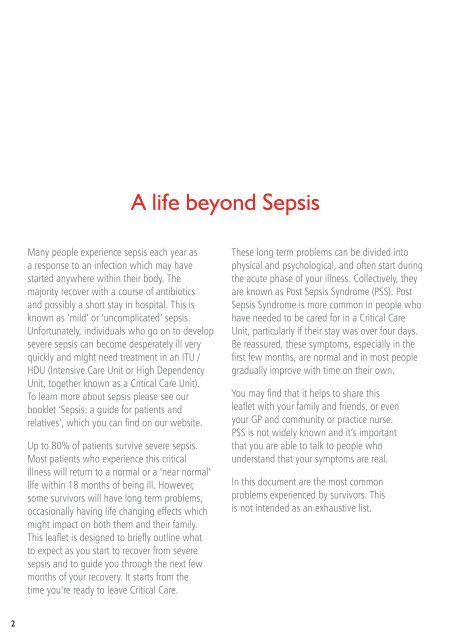SEPSIS Survivors Information
Sepsis-Survivors
Sepsis-Survivors
Create successful ePaper yourself
Turn your PDF publications into a flip-book with our unique Google optimized e-Paper software.
A life beyond Sepsis<br />
Many people experience sepsis each year as<br />
a response to an infection which may have<br />
started anywhere within their body. The<br />
majority recover with a course of antibiotics<br />
and possibly a short stay in hospital. This is<br />
known as ‘mild’ or ‘uncomplicated’ sepsis.<br />
Unfortunately, individuals who go on to develop<br />
severe sepsis can become desperately ill very<br />
quickly and might need treatment in an ITU /<br />
HDU (Intensive Care Unit or High Dependency<br />
Unit, together known as a Critical Care Unit).<br />
To learn more about sepsis please see our<br />
booklet ‘Sepsis: a guide for patients and<br />
relatives’, which you can find on our website.<br />
Up to 80% of patients survive severe sepsis.<br />
Most patients who experience this critical<br />
illness will return to a normal or a ‘near normal’<br />
life within 18 months of being ill. However,<br />
some survivors will have long term problems,<br />
occasionally having life changing effects which<br />
might impact on both them and their family.<br />
This leaflet is designed to briefly outline what<br />
to expect as you start to recover from severe<br />
sepsis and to guide you through the next few<br />
months of your recovery. It starts from the<br />
time you’re ready to leave Critical Care.<br />
These long term problems can be divided into<br />
physical and psychological, and often start during<br />
the acute phase of your illness. Collectively, they<br />
are known as Post Sepsis Syndrome (PSS). Post<br />
Sepsis Syndrome is more common in people who<br />
have needed to be cared for in a Critical Care<br />
Unit, particularly if their stay was over four days.<br />
Be reassured, these symptoms, especially in the<br />
first few months, are normal and in most people<br />
gradually improve with time on their own.<br />
You may find that it helps to share this<br />
leaflet with your family and friends, or even<br />
your GP and community or practice nurse.<br />
PSS is not widely known and it’s important<br />
that you are able to talk to people who<br />
understand that your symptoms are real.<br />
In this document are the most common<br />
problems experienced by survivors. This<br />
is not intended as an exhaustive list.<br />
2


